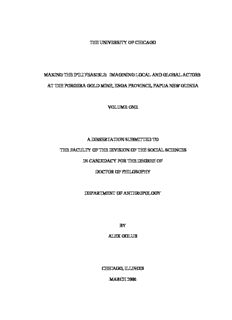
imagining local and global actors at the porgera gold mine, enga province PDF
Preview imagining local and global actors at the porgera gold mine, enga province
THE UNIVERSITY OF CHICAGO MAKING THE IPILI FEASIBLE: IMAGINING LOCAL AND GLOBAL ACTORS AT THE PORGERA GOLD MINE, ENGA PROVINCE, PAPUA NEW GUINEA VOLUME ONE A DISSERTATION SUBMITTED TO THE FACULTY OF THE DIVISION OF THE SOCIAL SCIENCES IN CANDIDACY FOR THE DEGREE OF DOCTOR OF PHILOSOPHY DEPARTMENT OF ANTHROPOLOGY BY ALEX GOLUB CHICAGO, ILLINOIS MARCH 2006 Copyright © 2006 by Alex Golub Permission is granted to make and distribute verbatim copies of this dissertation provided the copyright notice and this permission notice are preserved on all copies. To Kate Whose healthy and practical empiricism has long been an indispensable balance-wheel for an incurable theorist TABLE OF CONTENTS I. Introduction............................................................................................................11 The Mine, the Ipili, and Port Moresby.................................................................14 The Ipili.........................................................................................................20 The Nation....................................................................................................30 Engineering and Semiosis: Keeping the Mine Open............................................34 Imagining Local Actors: Making the Ipili Feasible......................................38 Imagining Global Actors: Who Are 'the Global'?.........................................44 From Simplification to Subsumption............................................................47 Personation and Impersonation.....................................................................51 Taking Big Actors Seriously: Synopticism and Irreduction.........................53 Conflicting Structures of Agency.................................................................56 Plan of the Dissertation.........................................................................................66 II. The Yakatabari Negotiations...............................................................................68 Conjunctures and Stakes.......................................................................................71 The Context of the Negotiations...................................................................72 Representatives.....................................................................................................82 The Mine.......................................................................................................82 Landowners...................................................................................................86 The Government...........................................................................................89 The Structure of the Meetings in Theory and in Practice.....................................94 The Meetings in Practice..............................................................................96 The Course of the Negotiations............................................................................99 The First Phase: Negotiating with Community Affairs........................................99 23 November Meeting................................................................................102 9 December Meeting...................................................................................107 The Yunarilama Drainage Tunnel and the Deadline for the Agreement............116 The Letter....................................................................................................117 The Deadline Approaches...........................................................................119 20 January Meeting.....................................................................................121 The Deadline Comes and Goes...................................................................122 The District Administrator's Letter.............................................................124 The Mine Goes Door to Door.....................................................................126 vi The Tunnel Surfaces, Literally...........................................................................128 24 March Meeting with the Secretary.........................................................131 The Lawsuit................................................................................................147 Ministerial Involvement and Internal Politics....................................................154 The Anawe Spill.........................................................................................160 Conclusion..........................................................................................................162 III. The History of Feasibility.................................................................................165 A History of Legibility?......................................................................................166 The Contact Period.............................................................................................169 The Strickland Syndicate....................................................................................175 Porgera as an Uncontrolled Area........................................................................179 Alluvial Miners...........................................................................................180 The Legal Status of Early Mining...............................................................184 Government Patrols....................................................................................186 Indigenous Miners......................................................................................189 Derestriction.......................................................................................................195 Placer and Exploration........................................................................................203 Feasibility Studies.......................................................................................208 Negotiations........................................................................................................212 The Compensation Agreement...................................................................212 The Relocation Agreement.........................................................................216 The Development of the Development Forum...........................................220 The Forum Process.....................................................................................226 The Signing and the Agreements........................................................................231 Conclusion..........................................................................................................235 IV. Postcolonial Redemptions.................................................................................238 Ipili Cosmology: Energy, Replacement, Embo..................................................242 The Kupiane Story......................................................................................246 Multiple Apocalypses.........................................................................................249 Massive Change..................................................................................................255 Social Change.............................................................................................258 Physical Change..........................................................................................262 Fulfilled Promises, Increased Expectations: Whites and Their World...............268 Dealing with Whites and Their World........................................................274 Whites in Papua New Guinea.............................................................................278 Heading North: Kiaps in Papua New Guinea.............................................281 Postcolonial Disenchantment......................................................................287 Working for the Mine.................................................................................289 Kiap Knowledge.................................................................................................292 The Ipili as Pathological Losers..................................................................296 Conclusion..........................................................................................................302 V. Being Ipili In Porgera.........................................................................................305 Relocation Communities....................................................................................309 Regional Identities and Clan Diasporas..............................................................314 Vertical Expressions of Horizontal Desires........................................................318 Land Ownership..........................................................................................325 Who Lives in Apalaka and Waiwanda...............................................................330 Some Notes on Methodology......................................................................333 vii Some Basic Census Data............................................................................336 Will the Real Epo Arene Please Stand Up?................................................339 Rentier Leadership......................................................................................343 Arenas for the Claiming of Identity in Porgera..................................................348 Who are the Official Landowners in Apalaka and Waiwanda?..................349 Royalties.....................................................................................................354 Compensation.............................................................................................358 Employment................................................................................................360 Conclusion..................................................................................................364 VI. Conclusion: Policy and Ambiguity..................................................................366 Registering Land and Landowners in Papua New Guinea.................................371 Finding True Land Owners - the View from Port Moresby...............................374 Examples of Land Tenure Issues........................................................................381 Kutubu.........................................................................................................382 Gobe............................................................................................................385 Hides...........................................................................................................386 Mt. Kare......................................................................................................389 Lihir.............................................................................................................390 Tolukuma....................................................................................................392 Frieda..........................................................................................................394 Ramu...........................................................................................................396 Conclusion: Hot Societies, Weak States.............................................................398 What Landowners Know............................................................................409 Bibliography.............................................................................................................413 LIST OF TABLES Table 1 Total Population of Apalaka and Waiwanda...........337 Table 2 Outsiders living in Apalaka and Waiwanda.............338 “We may not have a mine, but Alex will have one hell of a dissertation.” -Greg, after a tough round of negotiations ACKNOWLEDGMENTS I have many people to thank. In Chicago, the original members of my dissertation committee: Marshall Sahlins, Michael Silverstein, and Manuela Carneiro da Cunha. I also thank Danilyn Rutherford, whose generous help more than offset the fact that she was the “odd man out” as the late edition to a committee composed of Jewish Structuralists. Also I thank Martha Nussbaum, who served on the M.A. Committee but did not continue on to the Ph.D. Anne Chien was on neither and yet made both possible. Senior students Ira Bashkow and Rupert Stasch helped me with everything from how to hang mics to where to stay when I arrived in Moresby. Tom Strong and Lise Dobrin shared their fieldsites with me, as did Debra McDougall, who has been a close friend and colleague throughout the course of my career. Intellectually, I have profited from conversations with David Simmons, J Niimi, Seth Saunders, and particularly Jeff Bennett. Outside of the university, Andrew Huff, Cinnamon Cooper, Nazarin Hamzid, and the people at Gapersblock.com helped me explore what it means to be a writer rather than merely an academic. Kevin Caffrey, Alex Meadows, and David Follmer were good friends. Ken Hopper taught me institutional politics, Jim Nitti taught me the art of the short con, and AKMA taught me agape. My fellow Porgera specialists Jerry Jacka and Aletta Biersack were unstintingly generous, and Glenn Banks must be particularly thanked for his support and the encouragement he gave this dissertation from its inception to its final draft. I thank the U.S. Department of Education for Fulbright-Hayes Doctoral Dissertation Research x
Description: